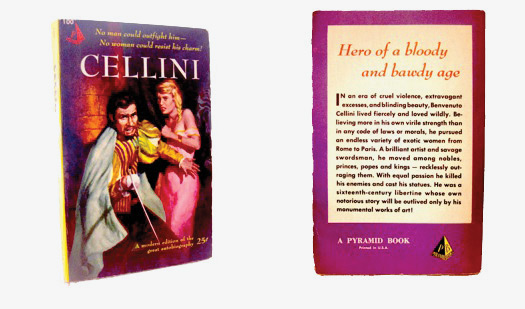
“No man could outfight him — No woman could resist his charm.” So reads the copy on this pulp cover from 1953. I picked it up for a buck from an antique shop a few blocks from my home. The packaging suggests a historical bodice-ripper and in fact the contents delivers on that torrid promise. It is not, however, an (entirely) fictional account. The book is actually the autobiography of Benvenuto Cellini, one of the great sculptors of the Renaissance.
Cellini is best remembered today for the Perseus and Medusa he crafted, on order of Cosimo de Medici, for the Loggia de Lanzi in Florence. It's a gory affair, and one senses that the artist, who claimed to have used his own sword in brutal fashion, saw himself in Perseus, a sense that is affirmed by the fact that he signed the sculpture, prominently, on a strap that crosses the hero's chest. (He probably would not have been pleased to learn that the esteemed Renaissance scholar Frederick Hartt called his masterpiece "remarkably inert.") Cellini fits squarely into that long tradition of artist rogues of which Caravaggio is only the most notorious. We have rather romantic notions in these modern times about what an artist should be (a tortured genius) and we like painters who fit into that paradigm.
Rubens, a most conventional UHB, was not that kind of artist, and I sometimes feel he suffers for it. His writing is a case in point. Familiar as they are with Cellini's rather purple and lurid precedent, even the most serious of art historians tend to dismiss Rubens the author as a colorless writer of arcanely detailed diplomatic treatises. This is not only crazy ironic (art historians making accusations of boring, jargon-y writing?), but a gross mischaracterization. Beyond his almost preposterous erudition, Rubens was in fact an elegant prose stylist who wrote with great personal conviction and with a rich vocabulary, a keen sense of metaphor, and a gift for a quotable turn of phrase. If some of his correspondence is necessarily technical, it was because he was conducting complex international diplomacy. Rubens, essentially, was an intellectual writer, a writer for the high-brow, and like so many high-brow (and middle-brow) writers in our day, he is suffering for it. Today we value the sensational. Cellini would have fit right in.
